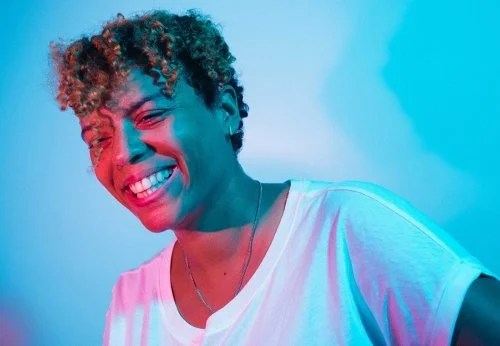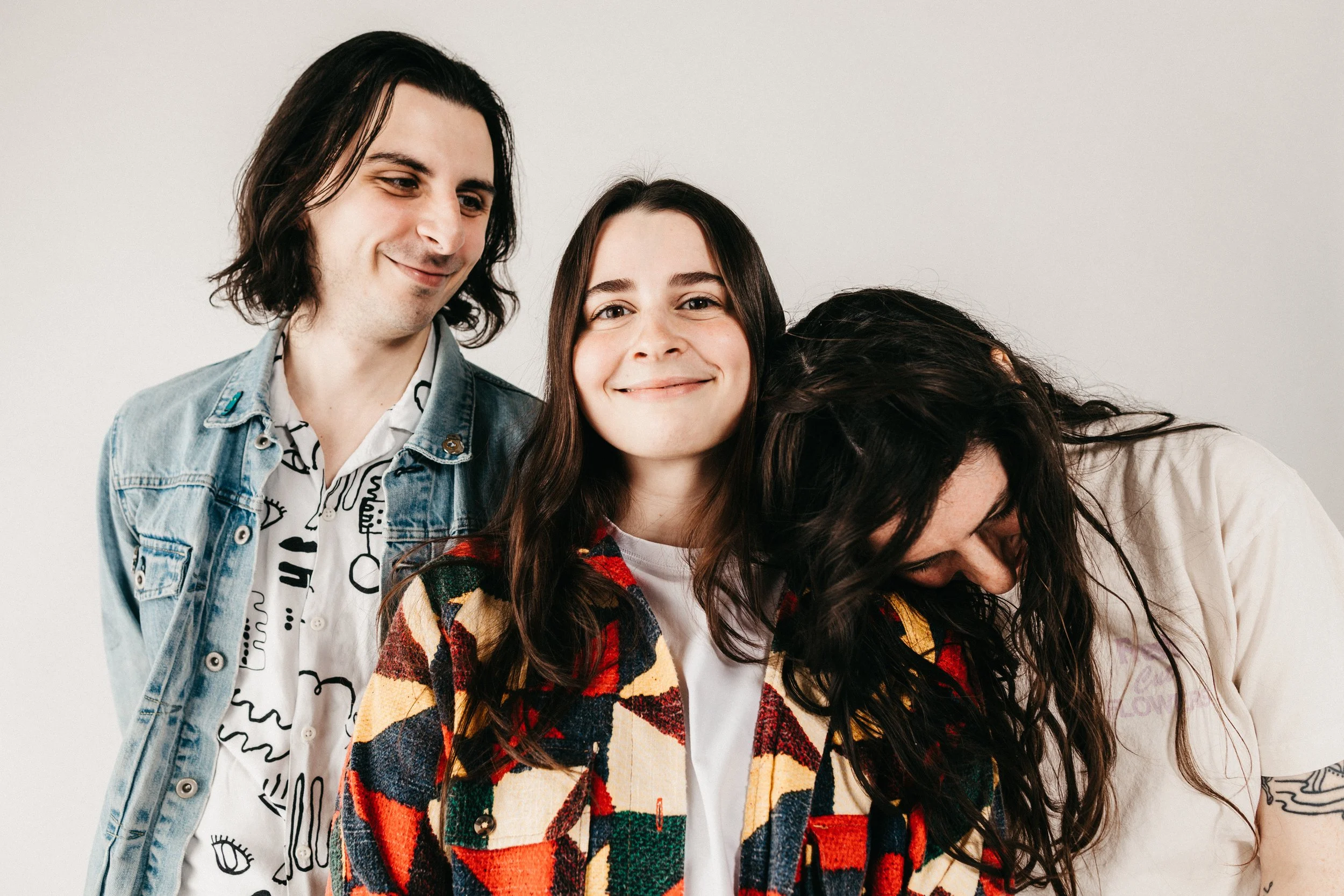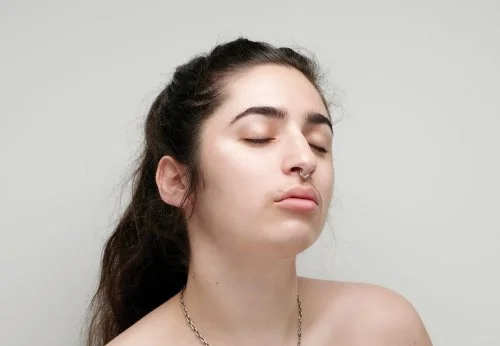ADHOC Presents: Oceanator with Queen of Jeans and Georgia Maq at The Broadway!
Oceanator
There’s a line on Oceanator’s debut full-length when Elise Okusami belts, “I think I think too much.” It’s a plainspoken yet
resounding thesis for an album called Things I Never Said, which sees the NYC multi-instrumentalist hyperbolically equating
early adulthood malaise with apocalyptic destruction. The type of anxieties that form when thoughts bottle up and stress gets
the best of you. Throughout the record, allusions to intrusive thoughts and depression-induced stasis are weaved in between
references to falling skies, rolling fires, and the possibility of the world literally falling apart. “If the sun never came up
tomorrow / do you think we would even notice?” Okusami asks in “I Would Find You,” a moody ode to staying out late and
sleeping until the afternoon. Or as Okusami puts it, “keeping to the shadows.”
However, while her emotional and physical solitude makes for a resilient foe, Things I Never Said is ultimately a record about
finding comfort in the face of destruction. Whether it be through appreciating the little things, like “hot tea on a cold fall day /
and dressing up for Halloween,” or forming a bond with someone you can mutually confide in about mental afflictions (“I told
you I could never be enough / you took me by the hand / and told me you understand”).
Complementary to the extraordinarily direct subject matter, the songs themselves are punchy, sticky, and immediately
engrossing pieces of heavy grunge-pop. The album opens with pounding power-chords that Okusami tastefully palm-mutes
in order to accentuate the hook, and then lets rip by the song’s gratifying climax, adding a simple yet hooky lead riff for extra
emphasis. Although she recruited a couple friends/members of the Oceanator touring band to play many of the bass and
drum parts, Okusami is the sole songwriter/arranger of her music, and the instrumentation feels intimately connected with
her lyrics.
“Heartbeat” is a racing power-pop cut with a joyously shreddy guitar arpeggio that perfectly translates the chest-thumping
rush of being near your loved one into song. “The Sky Is Falling” is a song about being consumed by depression and
witnessing everything fall down around you while you remain stuck in a state of paralysis. In it, Okusami’s voice is cleverly
quiet, stark, and resigned as the chaotic, walloping guitars thrash and burn around her. One of the record’s standouts, “A
Crack In The World,” breaks down into a half-tempo churn toward its end, as Okusami swears that “I’m still trying my best”
despite the news on the TV. The song literally sounds like it’s spiraling down into its titular crevice, while Okusami
desperately claws at the ground to keep “the skies blue anyway.”
There’s no concrete resolution to the album, but rather a vital reminder that love and friendship, both with others and herself,
will always reign victorious in our darkest moments. The album ends with a song aptly titled, “Sunshine,” in which Okusami,
backed by just her chugging guitar, details a day of venturing outside into the sun and subsequently accepting herself in
solitude. “I’m okay,” she repeats a few times at the end of the track, before resolving with the renewed comfort of “on my
own.” The album artwork features a cartoon sketch of Okusami sitting alone in a chair in front of a blue background that
could very well be those blue skies she was fighting to maintain sight of. Her tepidly peaceful demeanor on the cover art
suggests that she’s wise enough to know that this feeling won’t last forever, but that it will in fact return—echoing two of the
last lines on the album: “Sometimes it gets me down / but I usually come around.”
Queen of Jeans
Hiding in Place, the new EP from Philadelphia’s Queen of Jeans, opens with the springy pluck of a single note on electric guitar, like a ping from a satellite waiting for a response in a long, quiet expanse. Then, Miri Devora’s voice atop guitar and drums: “Hiding in place, conjure your face/Don’t wanna lose my mind.” This is the title track’s invitation to a four-song study of loneliness, alienation, and the unraveling that comes with those states, but it’s also bookended with moments of levity: joy and romance burst through on second track “Why Hide,” a response of sorts to the title track’s cloistered anxiety. Devora wrote the songs at the start of the pandemic in March 2020 when she had just been laid off from her job of almost 10 years. Her partner, guitarist Mattie Glass, worked 11 hour shifts at a grocery store, so Devora was alone in their apartment for months on end. When they were written, these weren’t intended to be pandemic-specific. “While these aren’t ‘pandemic songs,’ they carry that weight,” says Devora. “There’s that sense of loneliness and even longing that I think for many have gone hand-in-hand with the pandemic. Hiding in Place is like hiding within these walls that we were confined to, but it’s also about hiding within yourself and not being able to necessarily express any kind of fears or desires you have.”
Georgia Maq
Georgia Maq has established herself in recent years as the singer and guitarist of Melbourne, Australia indie rock band Camp Cope, whose sophomore album How to Socialise and Make Friends (Run For Cover/Poison City Records) won widespread acclaim, topping a slew of 2018 end of year lists including NPR, Pitchfork, Billboard, Bandcamp, Stereogum, The Guardian, and Brooklyn Vegan.
The impact of the trio’s music on the indie landscape has been undeniable, with Maq emerging as a brave, resilient, and often politicized figure. Using her formidable voice to fight for the betterment of the music industry and rally against sexism, racism and all forms of structural inequality, she has never shied away from the uncomfortable and difficult topics that dominate the news cycle.
So when Maq describes her debut solo album, Pleaser (Run For Cover/Poison City Records) as “a love album”, it’s immediately clear that this is a step in a different artistic direction. “I think the main theme is love, obviously, all kinds of love. Love that you walked away from so you could love yourself, unrequited love, forgiving love, love with no point to it,” she explains.




